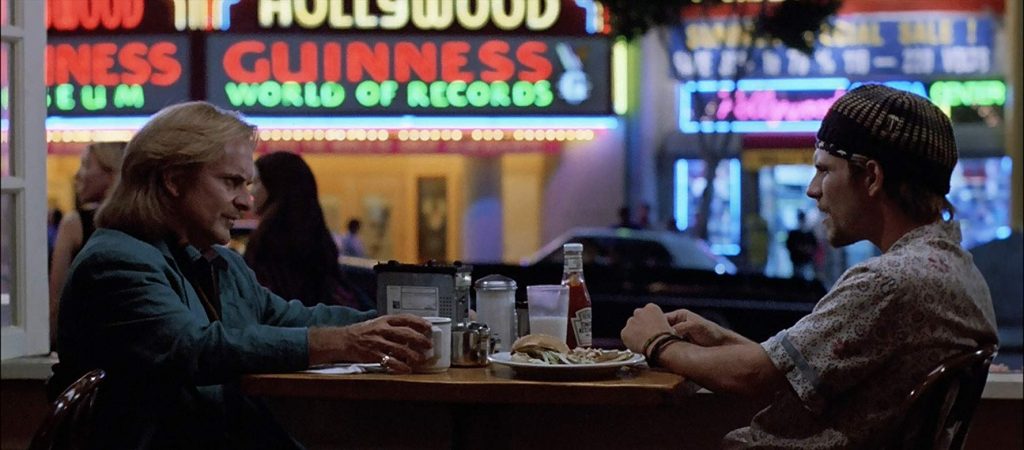Jimmy Hollywood (1994)

Jimmy Hollywood has always been a bit of a guilty pleasure for me, as I do concede that the main thrust of this satire is unfocused, losing itself on occasion under secondary side stories that do little to further the plot. Writer-director Barry Levinson spends a good deal of time in beefing up his quirky characters, although he only succeeds in making them more eccentric, instead of getting to just who they are and why any of them hang out with one another. Despite these flaws, I found Levinson’s story and characters to hold my interest, and the commentary on Hollywood, the media, and the state of stardom to be surprisingly well handled, even when the film sometimes drags by excess.
Joe Pesci plays aspiring actor Jimmy Alto, who came from New Jersey to Hollywood to pursue his dream of becoming a big-time movie star. After seven years, Jimmy has yet to land an acting gig, but when his car stereo gets stolen, he stumbles into the role of a lifetime. Along with his dim-witted friend William (Christian Slater) in tow, Jimmy takes his video camera and stakes out the neighborhood waiting for the perpetrator. They nab him, film him, and leave him for the cops, and sign the note left with an “S.O.S.” The police and media read the mysterious initials as part of a secret organization of vigilantes, and Jimmy decides to play along as if this were a role, changing his name to Jericho, leader of Save Our Streets (“S.O.S.”) With all the media focused on him, Jimmy plays his role to the hilt, videotaping police negligence and his own intervention, and publicizes it through the local media outlets. The cops are after him, but the citizens of Hollywood applaud him, and none of them realize his intentions are not to rid the streets of crime so much as to find the fame and glory he has been seeking all along.
If I could change one thing about Jimmy Hollywood, it would be the casting of the lead roles. Pesci and Abril are fine actors, and even Slater has shown appeal in some of his earlier movies, but somehow none of them really seem to click in their respective roles enough to believe. They come off more as caricatures rather than characters, although the writing supports the latter, and the result is a satire that probably plays more like a broad comedy than it should.
Levinson’s direction is excellent, with gorgeous camerawork, fantastic shoots on location in the streets of Hollywood, and sumptuous cinematography by Peter Sova. It perfectly captures the atmosphere of modern-day Tinseltown, a striking contrast to the Hollywood as depicted in the newsreels of the 40s and 50s. Levinson brings up how the city has plummeted from its once lofty heights, now corrupted by crime, poverty and noise pollution, falling apart before our very eyes.
Jimmy Hollywood is a fun film for film buffs, who should recognize the many allusions to the Hollywood of yesteryear, and also for those who enjoy satires on the moviemaking industry. Levinson has crafted a smart film, although it was marketed as a dumb comedy, and as a result, the intended audience has failed to find it. This plays on cable quite often, and can usually be found at the lowest price in many movie store discount bins, so if you have nothing better to watch, you may be pleasantly surprised by what Jimmy Hollywood has to offer. In my opinion, one of Levinson’s many underrated films.
Qwipster’s rating: B+
MPAA Rated: R for language and violence
Running Time: 112 min.
Cast: Joe Pesci, Christian Slater, Victoria Abril, Earl Billings, Jason Beghe, John Cothran Jr., Hal Fishman, Harrison Ford, Barry Levinson
Director: Barry Levinson
Screenplay: Barry Levinson
